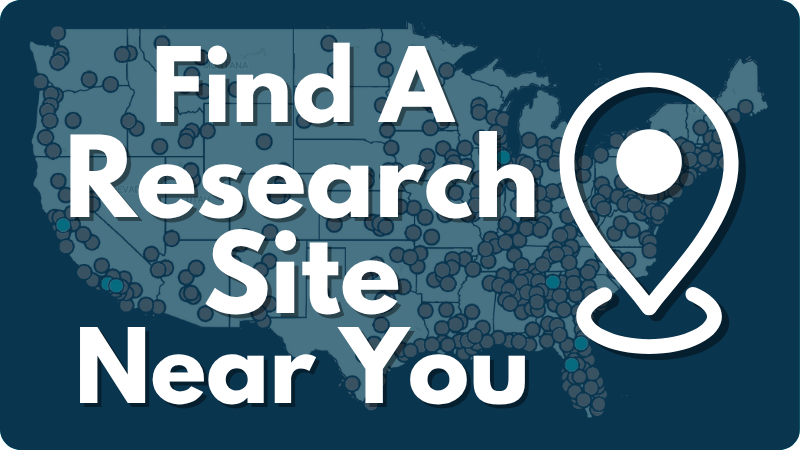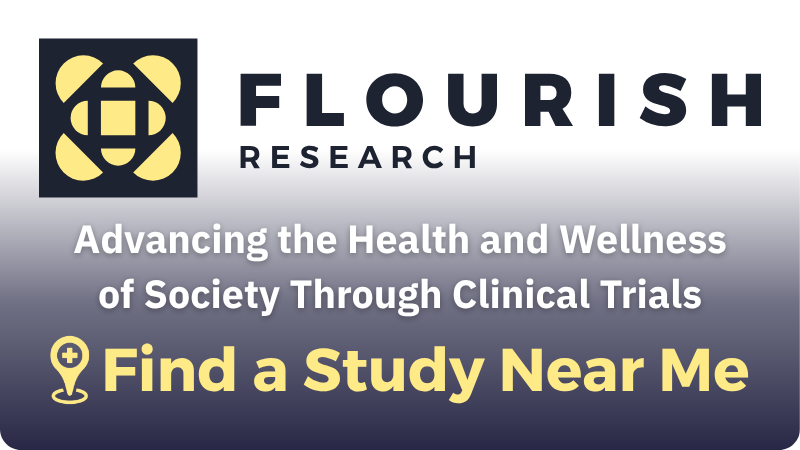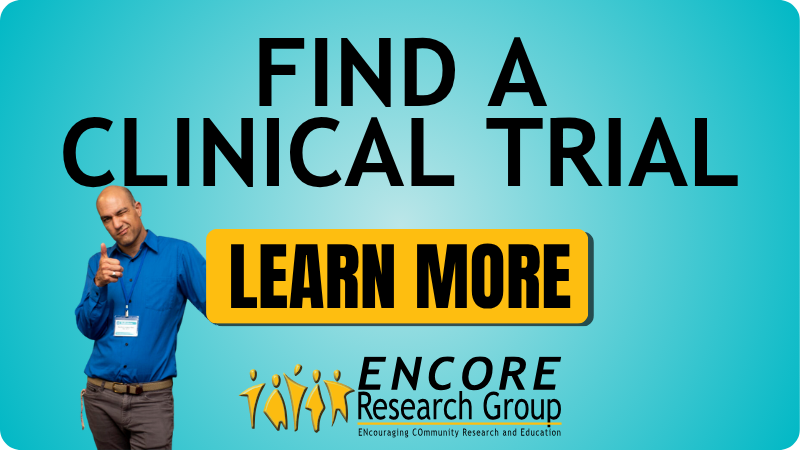The Generational Gains in the Clinical Research Experience

Audio
Transcripts
Transciprt Generated by AI.
Announcer: 0:00
Welcome to the MedEvidence Monday Minute Radio Show hosted by Kevin Geddings of WSOS St Augustine Radio and powered by ENCORE Research Group. Each Monday morning, Dr. Michael Koren calls in to bring you the latest medical updates with insightful discussions. Medevidence is where we help you navigate the real truth behind medical research, with both a clinical and research perspective. So sit back, relax and get ready to learn about the Truth Behind the Data in medicine and healthcare. This is MedEvidence!
Kevin Geddings: 0:30
Dr. Michael Koren joins us live on the studio line. Of course he is a medical doctor, cardiologist here locally and research scientist as well. We appreciate him taking time away from his very busy schedule and we were talking off the air about just how some things have changed for the good. Some things haven't changed for the good over the last 20 or 30 years, right, doc.
Dr. Michael Koren: 0:49
Yeah, Kevin, that really fascinates me. If you look at how things have gotten either better or worse over a generation, which is approximately 25 years, it's interesting to think about parts of our lives and whether or not things have gotten better or worse over 25 years. So, like, let me ask you, because I'm curious to hear your opinions um, food is obviously hugely important in our lives. Is that gotten better or worse in the last 25 years in terms of our experience in grocery stores and restaurants? What's your perspective on that?
Kevin Geddings: 1:19
I think it's gotten better. It certain tastes better, more fresh food, better access , right, and I would remember, you know it wasn't all that unusual to go to a friend's house when we were younger, right and have hamburger helper and think that was a good meal, right.
Dr. Michael Koren: 1:34
Yeah, yeah, I would agree. I think the diversity and the quality of restaurants has gotten much better, probably because of competition, and I would agree with you on the food front as well. Also probably due to competition is that virtually any kind of food you can get pretty easily these days. So let's throw another one out. How about air travel? Has that gotten better or worse in the last generation?
Kevin Geddings: 1:54
Oh, horrible, horrible. I mean airlines have turned into the Greyhound bus of the skies. You know, it's not just the delays, it's just, you know, the nonstop hassle of it all. And, yeah, I guess it is some of the canceled flights and you would think that that would have somehow gotten better. I will say more people are now able to fly. I think flying is more affordable than it was, say, when you and I were teenagers, right?
Dr. Michael Koren: 2:19
Yeah, although that's more than one generation ago.
Kevin Geddings: 2:22
Well, yeah, that's true. I'm trying to be nice to us.
Kevin Geddings: 2:28
Remember 10 years ago when we were 19, Dr. Koren
Dr. Michael Koren: 2:30
No, but I think to your point. I would agree with that. I think most people would probably come to the same conclusion that air travel has gotten worse and travel in general has probably gotten worse than it was 25 years ago. I was at the TWA hotel a couple of weeks ago and that was probably the golden age back in the early sixties, where, you know, people used to get dressed up and had nice meals and had a lot of leg room on the planes and but yeah, when you, when you actually got on the plane, people treated you like you were a valued guest and all that has sort of gone away. But, um, I would agree that air travel has probably gotten worse over the last generation.
Dr. Michael Koren: 3:03
How about telecommunications. I'm sorry, go ahead.
Kevin Geddings: 3:05
No, no, you're right. And telecommunications, obviously you know. I mean just the cell phone brick I bought at Circuit City in 1991, it's a lot better than the iPhone I have in my hand today. Right, so that's unbelievable.
Dr. Michael Koren: 3:16
Amazing, like astoundingly better than it was 25 years ago, right, no question. And then, when you look at that difference compared to air travel, it's clearly there's been a huge progression and so much better than it was. Okay, how about this? How about healthcare? Has it gotten better or worse in the last generation?
Kevin Geddings: 3:37
Well, certainly you feel like you can live longer. I feel a lot better getting a cancer diagnosis today than my mom passed away from cancer when she was young, from leukemia in 1965. I often think about that and I think I wonder if today, with the right diagnosis, she would have survived longer. You know?
Dr. Michael Koren: 3:58
Yeah, there are niches that we've made progress, but overall life expectancy in the United States has not increased over the last 10 years, even though it had been steadily getting better and better for literally 100 years. And you know the hassle factor medicine has gotten way worse, I would think. I don't know if you agree with that or not.
Kevin Geddings: 4:17
Yes, yes, I mean. The problem is we don't. You used to be able to sit down with your. You know, as a young child with a pediatrician would spend 30 minutes with you. But even as a young adult you could easily spend 10 or 15 minutes speaking with your family doc. That's probably not going to happen today.
Dr. Michael Koren: 4:34
Yeah. So I think overall, most people would say it's a little bit of a mixed bag, but it's certainly not better than it was a generation ago, and a lot of people argue that it's worse in some key metrics, like knowing what your plan is after you visit a healthcare facility or feeling like you've been heard by the people that are your healthcare providers I think most people would argue that that's probably gotten worse. Care providers I think most people would argue that that's probably gotten worse, and that's kind of a segue to research. Research is definitely an area that's gotten better and it's probably one of the exceptions to the rule in terms of where health care has progressed over the last generation. So, for example, you mentioned cancer diagnosis. Yeah, well, that's a lot better now because of research. Research has made astounding progress in that area In terms of treating cholesterol problems we've made astounding progress in that area.
Dr. Michael Koren: 5:26
Things that were not treatable are now completely treatable, and problems that led to heart attacks and strokes, such as your cholesterol level, are extraordinarily treatable nowadays with very easy-to-access, relatively simple treatments, and these are really remarkable breakthroughs.
Dr. Michael Koren: 5:43
But the other thing is that just the whole research experience. Over the last 25 years we've developed professional research sites like the ENCORE Research Group, and now you go in, you get seen quickly, you have somebody evaluate whether or not there's a research program that might be to your liking and helpful to you and your family, and then you have a fun experience. That's kind of all laid out for you and you always know what the plan is and you always have somebody that you can easily get in touch with in terms of questions that may arise during your experience. And hey, this is even better. You might even get paid a little bit for this experience, right? So you know, I would argue that the research element of health care has improved dramatically and it's probably a little bit of the exception to the rule of the overall not so great track record of health care over the last generation.
Kevin Geddings: 6:31
Yeah, no, absolutely. If you have any questions too about what we're talking about and you'd like to participate in clinical research, there are opportunities to do that from right here in St. Augustine and St. Johns County with ENCORE Research Group, go to EncoreDocs. com, E-N-C-O-R-E, encoredocs. com. I have to ask you too, Dr .Koren. We hear a lot of news out of Washington, with the new administration, of course, making some changes on vaccine recommendations and research funding for vaccines and the like. But there are still opportunities and we're still moving forward on clinical research right, despite what's going on in Washington.
Dr. Michael Koren: 7:06
Yeah, it's a little disconcerting and frustrating, quite frankly. And you and I have spoken about that specifically the government wanting to move on from messenger RNA vaccines, which is fine, but instead they're just shutting down other areas of vaccine research, which is not so cool. But despite those headwinds we're actually still doing programs.
Dr. Michael Koren: 7:28
There's still a lot of really exciting science and a lot of really nice opportunities for people to protect themselves and their family from viruses and other pathogens. So we're still doing work in the vaccine space despite some of these headwinds, and hopefully the government will straighten itself out. They are responding, they are stating that they want feedback and they will adjust their course, so we'll see what happens. I'm hopeful there. But overall, we have a tremendous number of really, really exciting programs and, for example, these GLP-1 drugs are all the rage and now we have medicines that will be usable with just one injection a week, for example Actually, one injection a month rather than one injection a week, for example. So that's a nice example of breakthroughs. And in the lipid space we have treatments that you take once every six months, which is really quite remarkable. So one of the things we're doing to make healthcare better is make it simpler for people by simplifying the treatment regimen.
Kevin Geddings: 8:25
Absolutely Well, once again, learn more about opportunities by going to EncoreDocs. com. You can also call. We were talking earlier about how you know healthcare and access to your physician was so much easier 25 years ago than it is today. Well, you'll get that sort of Marcus Welby style health care when you participate in these clinical trials, right, Dr Koren?
Dr. Michael Koren: 8:45
Absolutely so. Part of our mandate is to make sure that we understand everything about our patients, because our responsibility is to report the complete experience of a patient during the clinical research program to the federal government as part of your overall process and experience. And, as you've mentioned many times, it's the best health care you'll ever get. And again, we emphasize that this is care and not necessarily treatment. So care is that human-to-human interaction that makes us feel good about our interactions with different people that are looking out for our well-being and our wellness.
Dr. Michael Koren: 9:27
So hopefully you'll agree with 99% of people get surveyed that they would do another research study once they've been exposed to their first one.
Kevin Geddings: 9:35
Yep, it's a great experience. I've been in those with Dr. Koren and with ENCORE Research. Karen on our team has as well. We highly recommend the experience. It won't cost you anything and just maybe a few minutes of your time to learn how you can participate by calling 904-730-0166 for ENCORE Research Group here in St. John's County 904-730-0166. And before we let you go, Dr. Koren, a great resource for folks that may be inclined to just Google some health questions. They should try, you know, going to medevidence. com first correct.
Dr. Michael Koren: 10:11
Yeah, absolutely. I was at a dinner party over the weekend and showed a few people MedEvidence and people are just blown away when they see the wealth of information that's on that website and we have a lot of neat interviews, often between two physicians, where people can really dig into the Truth Behind the Data, really understand what we know about a particular area in medicine what we don't know and how we learn about the things that we don't know.
Dr. Michael Koren: 10:38
And we also have some really just entertaining guests, just fascinating people. So if you just want to learn the way doctors think and how we make decisions for ourselves and our family, check out MedEvidence! You'll love it.
Kevin Geddings: 10:50
Yeah, no, it's a great resource. Once again, go to MedEvidence. com. That's MedEvidence. com, Dr. Michael Koren, thanks for all your time this morning. Be safe out there and we'll speak with you next week, okay, look forward to it.
Dr. Michael Koren: 11:02
Take care, Kevin
Announcer: 11:03
Thanks for joining the MedEvidence podcast. To learn more, head over to medevidence. com or subscribe to our podcast on your favorite podcast platform.




